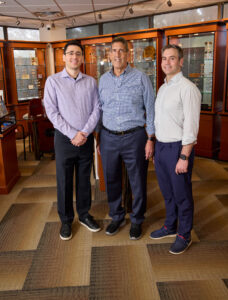
Dr. Alan Mendelsohn, Dr. Nathan Klein, and Dr. Alec Chaleff are avid believers in preventive care and have developed considerable expertise in these invaluable efforts. Upon completion of a comprehensive eye exam, each physician will spend considerable time with you in the exam room explaining your diagnosis(es), treatment recommendations, and very importantly elaborating upon recommendations for precise steps to greatly minimize or prevent ocular damage and/or diminished vision.
The depth and breadth of knowledge recently accrued by researchers and eye physicians in the area of ocular preventive care have been most gratifying. Unfortunately, the vast majority of eye physicians do not have an interest in ocular preventive care. Other eye physicians simply feel too rushed during your exam to spend extra time with you discussing and educating you on key points that hopefully will have a profound effect in enhancing your ocular health and quality of vision.
Very noteworthy is the fact that the ocular preventive care will markedly reduce or even eliminate the necessity of surgical intervention for macular degeneration, diabetic retinopathy or maculopathy, pterygium, pingueculas, eyelid cancers, and other ocular maladies. If procedures have already been performed elsewhere in the past, we hope to greatly reduce the change for a repeat surgery due to recurrences.
We fervently believe that the clinical, diagnostic, and surgical skills of our physicians are outstanding. Combining these skills with a highly professional staff and cutting-edge technology sets Eye Surgeons & Consultants apart. Adding to these components, the physicians’ efforts and expertise in ocular preventive care is what prominently elevates our practice as a truly comprehensive eye evaluation.
Stop smoking: Smoking greatly increases the prevalence and severity of almost every eye disease that can permanently reduce vision or even precipitate blindness. Many ophthalmologists strongly believe the incidence of macular degeneration and diabetic eye disease is 10 times greater for someone who smokes. If you have been diagnosed with glaucoma, thyroid eye disease, rheumatologic disease, sickle cell anemia, and other systemic diseases, the incidence of eye complications rises considerably with smoking. The only way to lower the risk is to stop smoking. Dr. Alan Mendelsohn, Dr. Nathan Klein, and Dr. Alec Chaleff are avid believers in encouraging smokers to stop in order to preserve the precious gift of eyesight. Please view this embedded video for an elaboration on how smoking leads to ocular damage.
Wear sunglasses with U-400 blocker and polarization: The connection between Ultraviolet Light (UV) and skin cancer is well known. But less well known but equally as important is how UV can cause of all kinds of eyelid cancers, growths and diseases. The best preventative measure is to wear sunglasses, which are polarized and have a UV-400 blocker on the front and the back, any time you are outside. This sunglass protection greatly reduces the incidence and severity of possible damage.
Avoid blue light: Known as High Energy Visible or HEV Light, blue light is emitted from your laptop, computer, smartphones as well as fluorescent bulbs. This exposure is cumulative over your life and is one of the major risk factors contributing to frequency and severity of Macular Degeneration, the nation’s leading cause of severe vision loss. Blue light also causes Digital Eye Strain (DES), characterized by eye fatigue, blurred vision, red and or dry eyes, eye discomfort and decreased productivity. While avoiding emission of blue light from the sun and digital devices is not feasible, there is a new wave of new eye glass lenses which dramatically minimize or eliminates DES. The blue blocker must be built within the lens to protect your eyes from harmful light, while allowing beneficial light to come through. We also highly recommend holding your digital device as far away from your face as possible to minimize any short or long term effects.
Include vitamins in your daily diet: There are six key active ingredients which you can incorporate into your diet to protect your eyes from oxidative damage and improve your visual function including: Copper, Lutein, Vitamin C, Vitamin E, Zeaxanthin and Zinc. We also recommend increasing your consumption of alpha omega-3 fatty acids. An alternative to the diet route is to take an AREDS 2 Vitamin supplement such Ocuvite 50+ or Preservision.
Ask your primary care physician for a prescription for the Shingles vaccine: Shingles develops in one out of three adult Americans. In more than 30 percent of those afflicted with Shingles, there is ocular involvement, which can range from moderate to severe to devastating. The new vaccine, Shingrix, has a 90 percent success rate; for this reason, The American Academy of Ophthalmology and the Centers for Disease Control and Prevention (CDC) have independently recommended that everyone age 50 and older should receive the Shingrix vaccine, unless they are immunocompromised. This vaccine can save your eyesight as well as potentially prevent the dreaded post-herpetic neuralgia, aka the ongoing burning pain that occurs in 20 percent of shingles patients.
